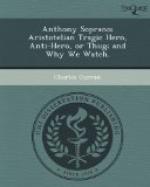|
This section contains 851 words (approx. 3 pages at 300 words per page) |

|
Will the Real Tragic Hero Please Stand Up?
Summary: The tragic hero is changing along with society; the tragic hero now falls not from a position of great influence, but from the hero's rightful place in society, and the tragic hero is no longer necessarily a man. When considering an ideal example of the traditional tragic hero, Hamlet, the most reasonable conclusion is to compare him with his most polar opposite, Offred, and through this, negotiate them both as the tragic heroes, simply of different times. This analysis draws upon the traditional argument espoused by Shakespearean scholar A.C. Bradley and the modern interpretation offered by playwright Arthur Miller.
The future is here, and the tragic hero is changing along with it. No longer must the Hero be of superior talent or status, the pains of mediocrity hit far closer to home. Achieving pathos is no longer done through the falling from grace of a man of high influence; it is his falling from his `rightful' place in society. Society today is changing, and thus the tragic hero must adapt or become obsolete to the new generation. The Modern Tragic Hero bears virtually no superficial similarities to his former self; in fact, he need not be a man at all. When considering such an ideal example of the traditional tragic hero, Hamlet, the most reasonable conclusion is to compare him with his most polar opposite, Offred, and through this, negotiate them both as the tragic heroes, simply of different times.
A.C. Bradley, the pre-eminent Shakespearian scholar...
|
This section contains 851 words (approx. 3 pages at 300 words per page) |

|


